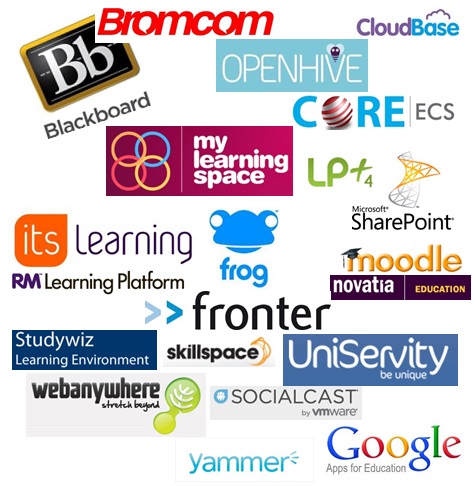The Future of the Learning Platform is Social
The developing role of the learning platform
Published: 25 January 2013
Virtual Learning Environments, Managed Learning Environments, Learning Management Systems and Learning Platforms originate from a desire by schools, colleges and universities to structure and organise the administration and distribution of teaching and learning resources. The history of the learning platform began with a period were educators praised its introduction to support teaching and learning and it is currently in a period were many educators are regrettably praying for its demise and questioning its necessity within an education setting. However, the advent of social media and enterprise social networks means that we may have to re-evaluate our perceptions of the learning platform; for the future of the learning platform is social.
Learning is fundamentally an outcome of social interaction between student and teacher and between students and their peers. Anything that promotes and encourages greater engagement between students and teachers and students and their peers should be welcomed. Learning platform providers have always recognised the value of building in a variety of collaboration tools into their eco-systems; but their take up has always been hindered either by school policies or by user interfaces that were designed before the era of Facebook or Twitter. Learning platforms have traditionally been used to host resources to support teaching and learning activities for designated courses, students and teachers. The ability to store and manage educational resources online has transformed how students enroll onto programmes, how they participate whilst on these programmes and how they are assessed and examined. With the advent of social networks, enterprise social networking and enterprise learning networks we will see a shift from the hosting and distribution of educational resources towards a social eco-system. The ability to access educational resources and to be able to share, discuss and collaborate on projects with other students and teachers will be welcomed by many across the education sector. The look and feel of social learning enterprises such as Yammer, Socialcast and Google Apps is refreshing to see. These enterprises see learning as being fundamentally social and their online collaboration tools support and reflect such an approach. The companies who have well established learning platforms within the education sector have the opportunity to learn and to adapt their services to reflect this new and emerging social learning environment. If they do not they will be abandoned by the schools, colleges and universities that they currently serve. In the UK, the government's Department for Education (DfE) has a well established framework that assists schools to purchase learning platform services. The companies listed on the learning platform framework are shown below. [1] I have also added the names of Blackboard, Google, Microsoft, Moodle, Socialcast and Yammer who are not listed on the DfE's learning platform procurement framework. |
|
|
Learning platform suppliers have sort to
leverage the power of social media
Learning platform suppliers:
|
|
Recent developments in learning platform services have sort to leverage the power of social media to enable individuals to work more collaboratively with one another in a safe and secure online environment. At the present moment in time many of the social learning platforms are used predominately amongst organisations in the private sector; but there is a tremendous opportunity to utilise these services within the education sector.
The future of the learning
platform is social
Traditional learning platforms within the education sector have always found it difficult to gain traction amongst teachers and students. One possible cause of this phenomenon is due in part to the top down structure of many learning platforms and where school policies mean that students have little or no input into the content that is posted to the learning platform. The advent of the social learning platform enables teachers and students to create, post and share their ideas and thoughts with their peers; and more importantly, their peers have the opportunity to respond, participate and work collaboratively with them.
Google Apps The adjacent video from Webanywhere highlights the main features of Google Apps for the education sector. [2] The services from Google enable teachers and students to collaborate with one another via applications such as Docs, Sites and Google +. |
Socialcast Socialcast is a VMware social networking platform for organisations that enables individuals to stay connected to one another so that they can share information and work collaboratively on shared projects. 'Socialcast is the enterprise social networking platform that connects people to the knowledge, ideas and resources they need to work better together.' [3] The adjacent video highlights the main features and functionality of Socialcast. As you will see there are obvious uses for Socialcast in schools, colleges and universities. [4]
|
|
Yammer Yammer is part of Microsoft's Office Division. Yammer is a secure and private social learning platform that enables everyone within a school to connect with one another, to collaborate with peers when working on joint projects, to share and exchange ideas and to keep up-to-date with the latest updates and feeds. Yammer is available via the web and can be accessed over your desktop, tablet and smartphone. [5] The content in the adjacent video is targeted specifically for companies in the private sector but the message is just as relevant for schools, colleges and universities. [6] 'Social media has dramatically changed the way we share and connect with friends and family, and it will have an even more profound impact on the way organisations operate. Giving your organisation the advantage of a social foundation is critical for success in today’s fast-paced environment.' [7] |
Footnotes:
-
Learning platform suppliers on the DfE Information Management and Learning Services Framework: http://gps.cabinetoffice.gov.uk/contracts/rm1500.
-
Google Apps video from Webanywhere: http://www.youtube.com/watch?v=dtpQfk441nc
-
Socialcast: http://www.socialcast.com/
-
Socialcast on YouTube: http://www.youtube.com/user/socialcastbyvmware
-
Yammer: https://www.yammer.com/product/
-
Yammer on YouTube: http://www.youtube.com/watch?v=dxDMaQWfykE&list=PL572388EB942FFA50
